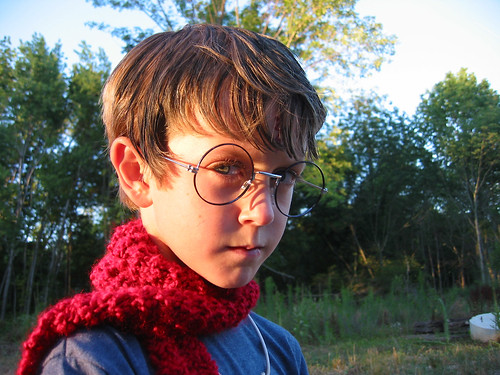
{Photo by rocketlass.}
As I read Laura Miller's charmingly conversational yet thoughtful The Magician's Book: A Skeptic's Adventures in Narnia (2008), I perked up at this passage about J. R. R. Tolkien:
Tolkien has had many admirers of considerable intellectual stature--Auden was his great champion in the press, and the novelist Iris Murdoch sent him fan mail--but this, too, doesn't go very far in persuading other intelligent people who can't abide his books. Murdoch perhaps chose the wisest course when her husband, the Oxford professor John Bayley, would demand to know how she could be so enthralled by books that were so "fantastically badly written": she'd stare at him in amazement and insist that she didn't know what he was talking about.Murdoch's response seems just right to me: Bayley is asking a question that doesn't really apply to the Lord of the Rings. Yes, they're badly written, teeth-clackingly awkward at times, but that's not the point. At their best, they immerse the reader in a world that seems inexhaustible, so fully imagined that we begin to suspect there's no question we could ask that Tolkien wouldn't have been able to answer--we feel that we've been invited to enter a supreme work of focused imagination, the vitality of which makes the clunky archaisms of Tolkien's prose entirely beside the point.
That said, neither Tolkien nor his friend C. S. Lewis were real touchstones for me as a young reader, like the latter was for Miller. I read and loved The Hobbit and The Lion, the Witch and the Wardrobe, but I felt none of the same magic from the two men's subsequent books. Looking back, I can see that they represented two important poles of imagination for me: the jumble-sale quality of Lewis's imagination--which, as Miller writes, "lifted figures and motifs in whole cloth from a motley assortment of national traditions, making no effort to integrate them into any coherent mythos"--clashed with my desire for order, while Tolkien's obsessive attention to detail (a quality I would later come to admire) took the books too far in the other direction, bogging them down in hours of elvensong when all I really wanted was for someone to draw sword in anger.
Neither author could match Lloyd Alexander's Chronicles of Prydain or Susan Cooper's Dark Is Risingi sequence (and in particular its first, and least fantastic book, Over Sea, Under Stone, which I read over and over). Looking back, I think that one overarching reason for my preference was that Narnia and Middle-Earth both lacked a quality I prized in fiction even as a boy: a sense of the everyday reality that lies underneath the fantasy and adventure. As Miller points out, neither Tolkien nor Lewis seemed all that interested in the day-to-day life of their worlds: there's no discernible economic activity, no incidental change, and--outside of Sam Gamgee--no characters who reveal long-range plans or aspirations that are disrupted by the events that have swept them up.
Alexander and Cooper, on the other hand, offer plenty of hints of what people in their worlds do when not questing: Taran is an assistant pig-keeper; Coll a full pig-keeper; Fflewddur Fflam a bard; Eilonwy, as a princess, is expected to do nothing--and that limitation drives her nuts. At the end of a battle, Coll laments the crops churned under by the fighting, a loss that will be felt that winter in the surrounding villages. In Over Sea, Under Stone, the Cornish village that the children visit on holiday is entirely ordinary, which makes the irruption of sinister forces and ancient magic all the more astonishing. It is a simple vacation with a somewhat distant relative, a situation we can all recognize--and then suddenly it's much more.
I was a very fortunate child, surrounded by a loving family in a rural freedom that seems more idyllic with every passing year. I didn't want to escape to somewhere: I wanted a world where adventure and dailiness could live side by side, where I could be part of momentous events but not have to give up the home I loved. Alexander and Cooper seemed to understand that in a way that Tolkien and Lewis--whom I now know were themselves in search of full-on escape from a world grown uncongenial--did not.
To circle back to where this post started, I'll turn once again to Iris Murdoch. In a 1962 interview for the Sunday Times, collected in From a Tiny Corner in the House of Fiction: Conversations with Iris Murdoch (2003, edited by Gillian Dooley), Murdoch responds to a question about whether there's a division between fantasy and reality in her own work:
If fantasy and realism are visible and separate aspects in a novel, then the novel is likely to be a failure. In real life the fantastic and the ordinary, the plain and the symbolic, are often indissolubly joined together, and I think the best novels explore and exhibit life without disjoining them.Though Murdoch wasn't referring here strictly, or even at all, to fantastic literature as represented by Tolkien, Lewis, et al., I think her point nonetheless has some validity. Cooper's and Alexander's books were so powerful for this young reader exactly because they "indissolubly joined" the world of the everyday and the world of the imagination; they offered a new reality I could believe in, and set alongside my own, rather than escape to.

